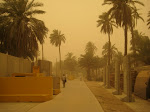 I have wanted to write a post about the fifth anniversary of the start of the war in Iraq but faced a conundrum: much smarter (and more passionate) writers and journalists have covered the subject online better than I could. Like many reading this blog, I spent most of those five years in the US, reading and watching news reports about the war. Five years ago, I had just started a new civilian job and wasn’t in a position to volunteer for service like I had following the 9/11/01 terrorist attacks. I remember picking up a newspaper in early April of 2003 showing a picture M1 Abrams tanks crossing into Baghdad and thinking about how little time it took the US Army to advance from Kuwait. Surely, the war is over, I thought -- a repeat of the 64 hour ground war during Operation Desert Storm in 1991. No one was thinking that a sophisticated and lethal insurgency was around the corner.
I have wanted to write a post about the fifth anniversary of the start of the war in Iraq but faced a conundrum: much smarter (and more passionate) writers and journalists have covered the subject online better than I could. Like many reading this blog, I spent most of those five years in the US, reading and watching news reports about the war. Five years ago, I had just started a new civilian job and wasn’t in a position to volunteer for service like I had following the 9/11/01 terrorist attacks. I remember picking up a newspaper in early April of 2003 showing a picture M1 Abrams tanks crossing into Baghdad and thinking about how little time it took the US Army to advance from Kuwait. Surely, the war is over, I thought -- a repeat of the 64 hour ground war during Operation Desert Storm in 1991. No one was thinking that a sophisticated and lethal insurgency was around the corner.I couldn’t tell you much about those first five years than you already know, if you’ve been paying attention. However, I will be here for most of year six. So far, it’s been very educational living and working in the Green Zone. In many ways, I’m grateful to finally be off the side lines and in the game contributing in a manner that I hope is useful. As my time here in Qatar comes to close, I’ve seen lots of enlisted kids on R&R four-day passes and can only wonder what their daily routine is like in whatever part of Iraq they come from. My job doesn’t involve carrying an M4 and patrolling on foot; I deeply admire and respect all those whose job that involves.
On Easter Sunday, Shi’a insurgents attacked the Green Zone with rockets and mortars. I read the reports on the web and made phone calls back to Baghdad. Thankfully, no one in the Embassy was hurt. The insurgents were either expressing displeasure with Sadr Ceasefire or commemorating, in their way, the anniversary of Baghdad’s fall five years ago. And in another sad confluence, the five year anniversary coincided with the death toll reaching four thousand.
Nations pay for what they want in blood and treasure. We have spent plenty of both in the last five years. Most of year five saw the troop surge in full effect and now we are seeing the first optimistic results: reduced ethno-sectarian violence, rejection of Al Qaeda by many Sunnis in Iraq, Al Qaeda’s marginalization and near last stand in Mosul. But there is still a lot to be done: the Iraqi Government must continue to stand up and take charge of the country, deeply suspicious Shi’as, Sunni, and Kurds must learn to establish trust and work together. It seems daunting but there are plenty of people, in and out of uniform, working hard to make it happen: Year Six.














